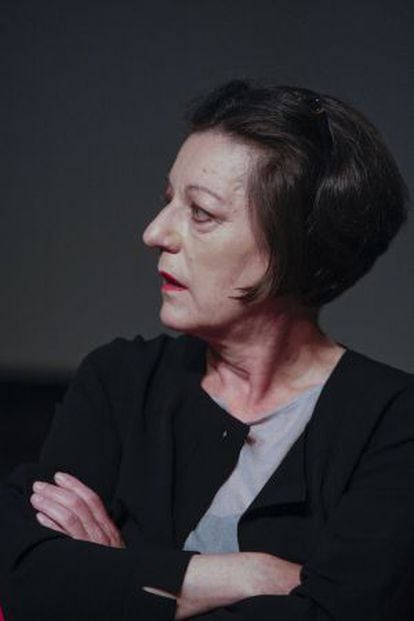Using language like a battering ram
Barcelona show examines painful life of Nobel Prize-winning writer Herta Müller


It might be the memory of the bright snow at the labor camp where her mother was confined for five years; or perhaps it is the light used in the interrogation sessions to which she was subjected by President Nicolae Ceausescu’s Securitate services. Or maybe it is the pain of the cold that bit into her eyes inside the truck that at last took her to Germany. Whether because of something real or imagined, 2009 Nobel Prize in Literature winner Herta Müller will not let anyone use a flash to photograph her. She does not trust the light. Nor does she trust language, as she pointed out during a recent conference at the Centre de Cultura Contemporània de Barcelona (CCCB). After she left, an exhibition about her life and work remained behind to shed light on the more painful shreds of her life. The show is sponsored by the Goethe Institut.
Dressed in black, with the tips of her short hair pointing at the audience like a bull’s horns, and a tendency to end her answers with a grimace, Müller’s hard sadness uses language as a battering ram. The attack begins with the very title of the conference: La lengua como patria (or, Language as homeland). “That is not my title: language is not a homeland, it never is; languages do not cause catastrophes...” she says. “A Cuban writer will speak the same language as his jailers, but that language will stop being his homeland.”
During the course of a talk as deep and unsettling as her prose, the Nobel winner had a few words for Spain: “Forgetting is a very complicated word. Who must do so? The victim? The victim needs it to be able to go on. The tormentor? In order to find justification? It must be a collective process and it is a difficult one. If it is not properly addressed, it will resurface again, as it did in Spain.”
The writer’s concern over the issue of memory is not gratuitous. Nor is her concern over language. They are part of her life. Nothing in her is gratuitous, not even her name. Herta, her grandmother told her, was the name of her mother’s best friend at the forced labor camp in Russia where she was taken in January 1945 along with 85,000 other Romanians from the German minority in order to repair their collective sins. Her mother always blamed the snow, which led her pursuers to her hiding place by the tracks she left in it. The metaphor at home was “the snow’s treason,” as Müller recalled at the conference.
Müller says she does not know where the frontier between forgetting and remembering lies, nor what citizens should do with their historical memory. Her own life and works are a faithful reflection of that. In the short stories that make up Niederungen, her first book, dating from 1982, one reads about the German-speaking Romanians who, like her own father, joined the SS. One also finds out about the deportations to Ukraine.
“I write in German but the Romanian language also travels with me, and each language has a different view of the world,” she says. “The Romanian view is tough and vulgar, but it has a metaphorical dimension that the German language lacks. [...] I can only touch upon reality by using metaphors.”
This capacity for metaphors is evident in the first poems she published in the press in 1972. The CCCB exhibition shows pictures of a young woman with long legs standing between her parents. In another image, we see her father, a soldier in the Regiment Number Two of the 10th SS Panzer Division Frundsberg of the Reich.
“My preferences for writing prose or poetry are intuitive,” she says. “When I was heading out for the Securitate interrogations, I used to recite poetry, it gave me strength… The fear of death does not eliminate our feelings; fear does not make you lose your fantasy, instead you go a little crazier, your eyes become bigger… I have experienced it; poetry is more pragmatic for survival; it makes you feel calmer; thus the limitless love of poetry during dictatorships.”
The exhibition reviews Müller’s heroic actions under one of the most ferocious dictatorships of all, that of Nicolae Ceaucescu. Those were her years of action in groups such as Banat. That quickly caught the attention of the Romanian apparatchiks. In a letter from 1985 included in the show, authorities sound the alarm about a young woman who writes in “a discriminatory, morally and religiously indecent manner.” She was described as “an author of lies.”
Following The Passport (1986), the constant interrogations, the harassment of her friends, the spying and the censorship of her texts left her on the brink of the abyss. In March 1987, she desperately sought a permit to leave the country that cost the German government 8,000 marks, and as many again had to be paid by her family to bribe the necessary officials. She crossed the border carrying a box with her belongings that could not have weighed more than 70 kilograms. Her other things had to be auctioned off for a song at official appraisal values, explains the exhibition, which highlights pictures of Müller with the man who was then her husband.
Three volumes with 914 pages of content are the official memory of Herta Müller in Romania: that is the material contained in the “Cristina file” kept by the Securitate. “A few former members joked when they gave me the Nobel prize three years ago that they deserved half of it for contributing to create the obsessions of my literary world... No, I will not go back to Romania, to them I am not Romanian, but someone from a minority; besides, it is not a consolidated democracy and corruption is rampant; I also do not see the need to live where you were born.”
These days, out of the 1,500 residents of Nitchidorf, where Müller was born in 1953, there are barely 20 Germans left. In her last novel, Everything I Possess I Carry With Me, the main character confesses upon returning from the Russian camp: “In my treasures it says I AM NOT GETTING OUT OF HERE.” Müller does not seem to be able to get away from that triangle formed by the role played by her father, the repression suffered by her mother and her own persecution. This is bad for her, and good for literature.
Herta Müller. El círculo vicioso de las palabras. Until July 1 at CCCB, Barcelona. www.cccb.org/es










































